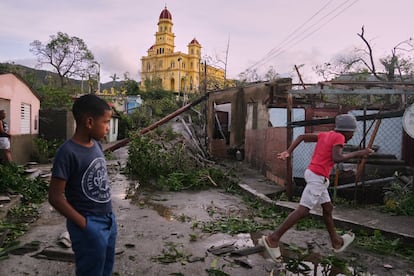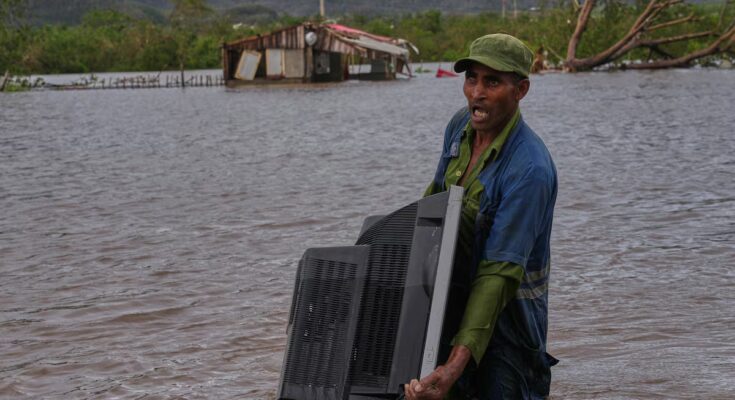Minguito He didn’t know he was famous until people started stopping him on the street. They wanted to verify that he was the man who, in the middle of a river flood, after the passage of the hurricane Melissa across Cuba, he grabbed his television as one would grab a drowning family member, bringing an appliance to life. An Associated Press photographer saw it, pressed the shutter, and the moment became the portrait of the Cuban disaster: a man with his olive green military cap and the crooked eye, saving what could no longer be saved, carrying under his arm what he knows is destined to die.
Amid the lack of communication with eastern Cuba, Minguitoor Duany Calzado Despaigne, 40, and his television were for a moment almost the only thing we knew about the devastation the hurricane brought to the country. Minguito He went viral, his face reached places he didn’t know, far from the town where he lives on the outskirts of Santiago de Cuba, and he was seen by people who, in other circumstances, he would never have met.
Activist Yasser Sosa Tamayo visited him days later and we learned this from him Minguitto He lived in a house with wooden walls and a fiber roof that the wind blew away. He raised animals that the hurricane made disappear. He had a bed, a fan and several vases that he can’t find now. He has dedicated almost his entire life to charcoal production, work he did to raise the 35,000 pesos (about $77) that his Panda television set cost him. The moment he knew the house was flooding, he took nothing else. “Television is life,” he said. He would come home from work and sit down to watch whatever show was on, all the entertainment was on that screen. The artifact did not survive MelissaBut Minguito he wants to keep it. “To remember it, how do I throw it away?”
For a portrait like this to exist, Minguito He must have been a boy with too little. The hurricane in Cuba hits harder and harder those who have less or almost nothing. The hurricane, in the end, uncovers the hole of misery.
Before the passage of Melissamy father and I were on the small balcony of a four-story building in southern from Miami. There was an air that erased everything, even the memory. “Do you remember when the cyclones came and we slept on the roof?” asked my father, who has been away from home for almost three years. I wanted to know, actually, if he remembered what we once were.
That image often returns, especially in the solitude of the emigrant. Under the sky, clear and still, we were freed from the heat of lightless days. We lived in a coastal city west of Havana that would be shaken dramatically by any cyclone or hurricane. Those days were special, they still are. The voice of Cuba’s most popular meteorologist, José Rubiera, crept into the living rooms of homes while there was light, and people did exactly what Rubiera had ordered: shore up roofs and windows, stockpile food, fill any container with water, in a previous fight with the cyclone, or take in advance from the hurricane what they could not recover later.
The day of the cyclone was long, of waiting, so much so that we arrived tired or asleep at the moment when it finally passed over us, or crossed us from the inside. In my childhood memories there was no greater joy: no friend from the neighborhood went to school, the domino table was set early and the house was filled with neighbors, something that for me was a celebration, in reality foreign to those people who would lose everything the next day.
Orlando, a washing machine repairman, or Esperanza and Tatá, a coal miners couple in their 80s, have moved into our house. I didn’t realize how lucky we were to have, at that time, a house without luxuries, but with concrete walls and roof, which would remain where it was, almost impossible for it to be blown away by any passing wind. For us Cubans, accustomed to thinking of being inhabitants of a country without social classes, the cyclone divided us and, for the moment, the status was marked by a coherent ceiling, or by a rechargeable lamp to illuminate the blackouts, even by the water tank to wash, flush and cook at the same time.
The morning after the passage of the cyclone, almost always humid, dirty and grey, was the moment my father and I looked forward to most. We went out hand in hand to tour the whole town, and we made the roll call and the amazement: the tamarind tree collapsing; the pig that Pupo managed to save in the bathroom; the village where my father worked, now homeless or flooded; Yamilet’s house, whose windows were blown down by the wind; and that of my little friend Fuentes, into which the whole North Sea entered.
Each loss meant a caravan of haggard faces, people shocked by what the sea had appropriated, angry about the television they would no longer be able to turn on, or the wet mattress that would take days to dry. The city became an inhospitable place, from which each cyclone tore off a limb: the doors of the IT center, which they were not there to replace at the time; the roof tiles of the elementary school, which flew away; the polyclinic, increasingly destroyed. There were houses that a cyclone demolished in stages: the kitchen, then the bathroom, then the living room, and so an entire family ended up sleeping, eating and washing in one room of what was their house. As the days went by we got used to living with less.
The cyclones and hurricanes kept coming. The window that the hurricane didn’t take away Flora (1960), Kate (1979) took it. The road that the hurricane did not raise Michelle (2001), or the walls he did not break down Charlie (2004), he did Wilma (2005). And to the disaster that the previous ones had left was added that of ike (2008) or Gustavo (2008). And if the accumulated poverty wasn’t enough, the hurricane Irma (2017) or Ian (2022) reinforced the misery. The accumulated damage no longer seemed to be the fault of a specific hurricane, but of something much more consistent, long-lasting and powerful.
Very few have recovered from a hurricane. Over the days, always late, and to the desperation of the people, a water pipe began to appear, they restored some electrical transformers, and distributed tiles for the roof which would collapse in the next cyclone. He never went to our people, but in some of the most devastated places Fidel Castro sometimes appeared in person, put his hand on the shoulders of the victims, carried in his arms a child who stayed up late at night and repeated, in his many versions, that in Cuba cyclones are not human tragedies, but battles to be fought together. Or even more so that they were proof of the moral strength of the people. Castro guaranteed the discourse of the future, and now, with the disappearance Melissait is Lis Cuesta, wife of the sovereign Miguel Díaz-Canel, who stated that “the hurricane is not stronger than the will of these people”.
But the city is exhausted, as if the greatest hurricane, the system, had not just dissolved. Noris, the old woman with the noble laugh, did not start cooking with wood or sleeping in “small clothes”, without a mattress, the day she died. Melissa. The toothless farmer has mud on the ground because his floor has always been dirty. The numerous sheltered families have not had a dignified place to live for a long time. The United Nations says more than 3.5 million people were affected by the recent hurricane, but in reality many more people spend the year surviving the storm.
The international community and exiles mobilized to send food, clothing and medicine. “Cuba needs everything,” they say. Ships arrive from Venezuela, the UN collects millions, other governments join in and Marco Rubio, US Secretary of State, is willing to lend a hand, but without “intermediaries”, that is, without the Havana government participating in the distribution. There are those who agree with the Cuban-American, after Castroism has ended up pocketing what belongs to the people so many times. There are those who criticize the aid as “handouts”. There are those who ask that Cubans stop, at least for this time, worrying less about politics and more about the child whose clothes have been blown away by the wind, or the mother who has no milk to feed him.

The toll of the hurricane is not what it leaves behind at this time, but the poverty it accumulates. Those who have lost what little they had will be much more humble than yesterday. For the hungry family, the donation bag will only relieve them of the day’s dinner. The light will not come, because in truth it was already gone some time ago. Neighborhoods will barely have water, as they almost always do. Since the country did not collapse again, the storm had been there for a long time.



